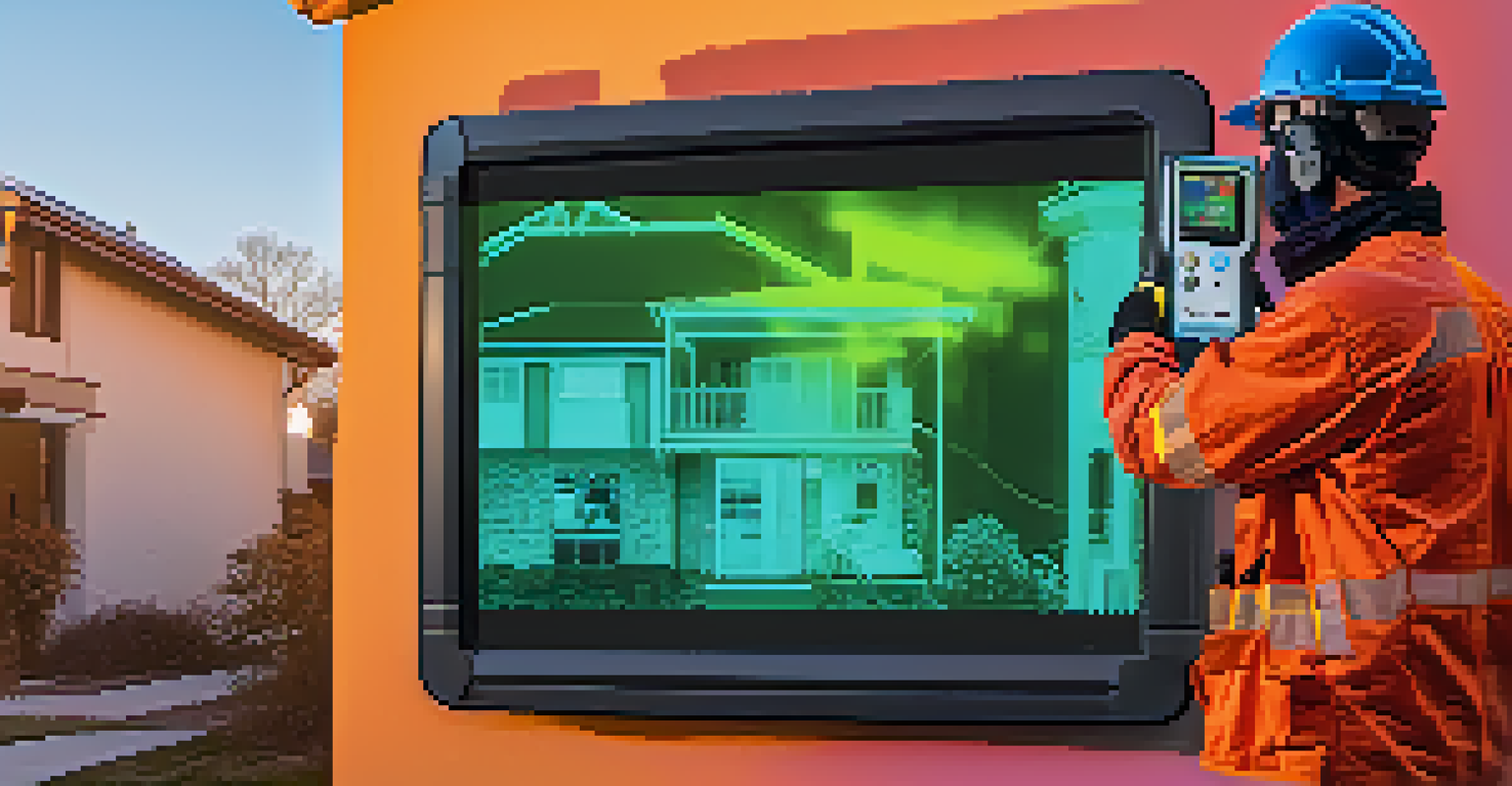Understanding the Role of Energy Audits in Home Design

What is an Energy Audit and Why is it Important?
An energy audit is a thorough assessment of a home’s energy use and efficiency. It identifies areas where energy is wasted and provides recommendations for improvement. This process is crucial not only for reducing energy costs but also for enhancing overall comfort within the home.
Energy efficiency is not just a policy choice; it's a way to maximize our resources and make a sustainable future.
During an energy audit, professionals evaluate insulation, windows, heating, and cooling systems, as well as appliances. They may use tools like blower doors and thermal imaging to pinpoint energy leaks. Understanding these aspects helps homeowners make informed decisions about upgrades and repairs.
By recognizing where energy loss occurs, homeowners can implement changes that lead to significant savings on utility bills. Moreover, energy audits play a key role in promoting sustainability and reducing a home's carbon footprint.
The Benefits of Energy Audits for Homeowners
One of the most significant benefits of energy audits is the potential for cost savings. By addressing the inefficiencies identified during the audit, homeowners can lower their energy bills considerably. Over time, these savings can offset the initial investment in the audit and any recommended improvements.

Additionally, energy audits can enhance the comfort of a living space. By improving insulation, sealing leaks, and upgrading outdated systems, homeowners can maintain more consistent temperatures. This means fewer drafts in winter and cooler indoor conditions in summer, contributing to a more comfortable home environment.
Energy Audits Cut Costs and Waste
An energy audit identifies inefficiencies in a home’s energy use, leading to significant savings on utility bills and reduced energy waste.
Finally, energy audits can increase a home’s value. Prospective buyers often appreciate energy-efficient homes, which can lead to quicker sales and potentially higher offers. Investing in an energy audit not only benefits current homeowners but also makes the property more attractive on the market.
How Energy Audits Influence Home Design Choices
Energy audits provide valuable insights that can shape home design choices, especially during renovations or new builds. For instance, knowing which areas of the home are less efficient can guide decisions on where to add insulation or how to position windows for optimal natural light. This strategic approach can enhance both aesthetics and functionality.
The best way to save money on energy bills is to improve your home’s energy efficiency.
Moreover, the recommendations from an energy audit often align with modern sustainable design trends. Homeowners are increasingly interested in energy-efficient materials and systems that not only reduce consumption but also complement their design vision. This synergy between energy efficiency and aesthetics can lead to innovative and beautiful home designs.
Incorporating the findings of an energy audit into the design process fosters a more holistic approach to homebuilding. It encourages homeowners and designers to think critically about the long-term impacts of their choices, leading to better overall outcomes for both the environment and the occupants.
Common Areas of Energy Loss Identified in Audits
Energy audits typically reveal several common areas where homes lose energy. For example, gaps around windows and doors, insufficient insulation in attics, and outdated HVAC systems can all contribute to higher energy costs. Identifying these issues helps homeowners prioritize which improvements to tackle first.
Another common culprit is air leakage, which can occur through small cracks and holes in walls, ceilings, and floors. This leakage can significantly affect a home's energy efficiency, making it essential to seal these gaps properly. An energy audit highlights these vulnerabilities, allowing for targeted repairs that can make a big impact.
Improving Comfort Through Efficiency
By addressing areas like insulation and air leaks, energy audits enhance overall home comfort with consistent temperatures year-round.
Lastly, the audit may uncover inefficiencies in appliances and lighting. Older models consume more energy than newer, energy-efficient alternatives. By upgrading to modern appliances and LED lighting, homeowners can not only save on energy bills but also enjoy a more environmentally friendly home.
Integrating Energy Efficiency into Home Design Trends
As sustainability becomes a priority, integrating energy efficiency into home design is more relevant than ever. Designers are increasingly using energy audits to guide their choices in materials and systems, ensuring that homes are both stylish and efficient. This trend reflects a growing awareness of the importance of reducing energy consumption.
For instance, many modern homes feature open floor plans that maximize natural light and reduce reliance on artificial lighting. Energy audits can inform how to best position windows and skylights, creating bright spaces that feel inviting while minimizing energy use. This integration of design and efficiency can enhance the overall living experience.
Additionally, the use of sustainable materials, such as reclaimed wood or recycled insulation, is becoming more common. Energy audits help identify where these materials can be most effectively utilized, thus promoting a design that aligns with eco-friendly values. Homeowners can feel good about their choices, knowing they’re contributing to a healthier planet.
The Role of Technology in Energy Audits
Technology plays a significant role in modern energy audits, making the process more accurate and efficient. Tools like thermal imaging cameras and energy modeling software allow auditors to gather detailed data about a home's energy performance. This information can pinpoint specific issues that may not be visible to the naked eye.
Smart home technology is also becoming a game-changer in energy efficiency. Systems like smart thermostats and energy monitors provide real-time data on energy usage, helping homeowners make informed decisions. These tools can complement the findings of an energy audit by offering ongoing insights into how to maintain and improve energy efficiency.
Technology Enhances Energy Audits
Modern tools like thermal imaging and smart home technology improve the accuracy of energy audits, empowering homeowners to track and optimize their energy usage.
As technology evolves, it continues to enhance the effectiveness of energy audits. Homeowners can expect more precise recommendations and innovative solutions that make it easier to implement changes. This integration of technology not only simplifies the process but also empowers homeowners to take control of their energy consumption.
Choosing the Right Energy Auditor for Your Home
Selecting the right energy auditor is crucial for obtaining accurate and actionable insights. Homeowners should look for professionals with certifications from recognized organizations, such as the Residential Energy Services Network (RESNET) or the Building Performance Institute (BPI). These credentials indicate that the auditor has undergone proper training and adheres to industry standards.
It's also beneficial to read reviews and ask for recommendations from friends or family. A trusted auditor will have a track record of satisfied clients and will be willing to answer any questions about their process. Open communication can lead to a more tailored audit that meets the specific needs of your home.

Finally, consider the auditor's approach to the assessment. A comprehensive audit should include both visual inspections and the use of specialized tools. This blend of techniques ensures a thorough understanding of the home's energy performance, paving the way for effective recommendations and improvements.